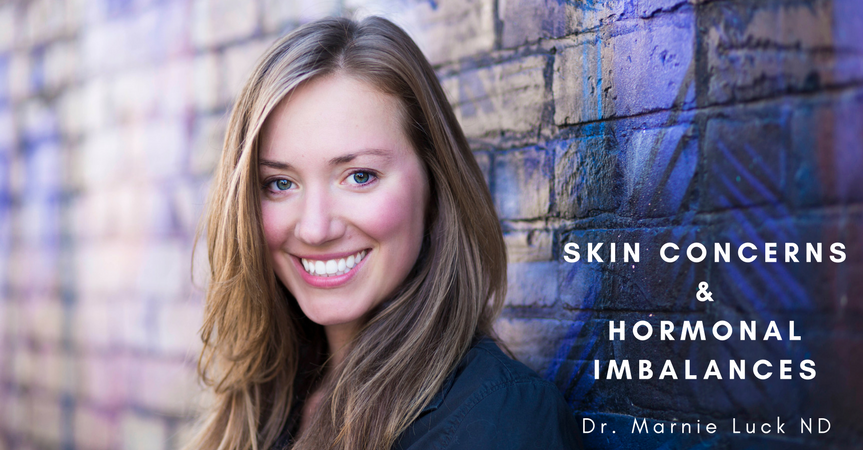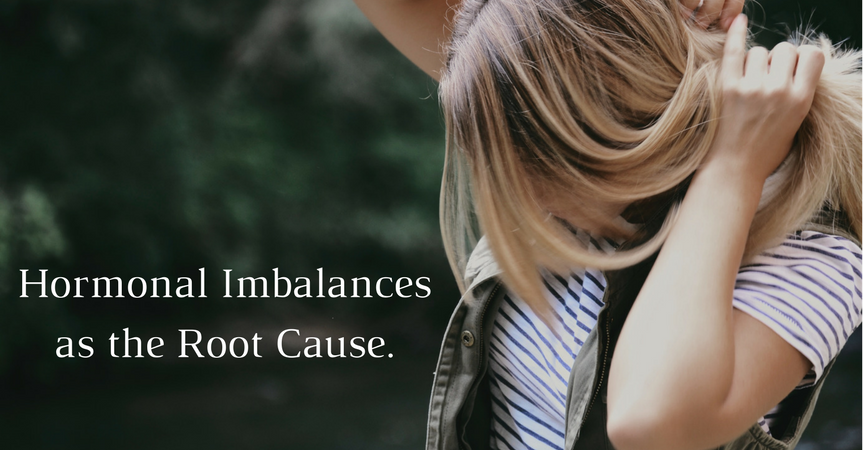Hormonal Imbalance and Skin Concerns.
This is a topic that is near and dear to my heart. You wouldn’t know it now, but I struggled with my skin for years. I remember thinking, “I just need to find the right product – or wash my face more often – maybe my skin will clear up” … at that point, I don’t think I was aware that there could be an underlying root cause of my skin concerns. At the same time, hormones remained a mystery to me. My period was a mysterious monthly event that aggravated my skin. A decade or so later, and many moons of education, extra learning, and clinical practice- I get it – and LOVE helping my patients and other women gain a better understanding of hormones, and how they affect the skin.
When it comes to hormones: it’s all about balance and- it’s a little complicated.
Let’s start off by exploring our menstrual cycle to understand what hormones are responsible for. In the first half of our cycle, estrogen is the dominant hormone. It is responsible for building the uterine lining. After ovulation, progesterone is the dominant hormones and it maintains the uterine lining. Right before our period, our progesterone level drops and we get our period. When the balance and fluctuation of our hormones are off- skin concerns, amongst other symptoms, may occur.
Common Hormonal Imbalances that Contribute to Skin Concerns:
Estrogen Dominance
Estrogen dominance occurs when there is too much estrogen in circulation or estrogen receptors are a being over-stimulated. Symptoms of estrogen dominance include ACNE (generally premenstrually), PMS (irritability, breast tenderness and swelling, constipation, bloating, headaches), painful or irregular periods and insomnia.
The root causes of estrogen dominance can be attributed to:
- Dysfunction of Liver Detoxification.
- Increased Estrogen Production.
- Relative Estrogen Excess (Progesterone Deficiency).
- Xenoestrogens (pollutants and chemicals in our environment that mimic and exert strong estrogenic effects).
Read more about how to treat estrogen dominance through diet and lifestyle.
Polycystic Ovarian Syndrome.
Polycystic Ovarian Syndrome occurs as a result of increased androgens (like testosterone – which increases sebum production) circulating in the bloodstream and problems with blood sugar metabolism. Symptoms of PCOS include ACNE (generally cystic, jawline, non-cyclical), irregular timing of periods (longer than a month apart), changes in hair growth, infertility and weight gain.
The root causes of Polycystic Ovarian Syndrome include:
- Insulin resistance.
- Genetics.
- Endocrine Disrupting Chemicals (like BPA).
Read more about PCOS and Treatment Approaches.
Dysregulated Cortisol and an Overactive Stress Response.
Cortisol is a hormone that is produced in the adrenal gland and regulates our diurnal rhythm. It spikes in the morning and decreases throughout the day. When we are stressed, our body produces more cortisol. Excess cortisol thickens serums and disrupts the normal production of sex hormones. Cortisol also increases blood sugar.
Learn more about the negative effects of high cortisol
Understand more about your body’s stress response.
Addressing the Root Causes of Hormonal Imbalances.
Although the root causes of skin concerns are multifactorial, there are some basic lifestyle factors that support healthy hormones.
Support Liver Function.
- Creating a healthy, moderate relationship with Alcohol/Drugs which burden the liver.
- Consume cruciferous vegetables and bitter greens that support liver detoxification.
- Drink lemon water daily.
Decrease Inflammation.
- Removing excess sugar from the diet.
- Reducing stress.
- Healing the gut and promoting optimal digestion.
Stabilize Blood Sugar.
- Eating 3 healthy meals a day. 12 hour fast overnight.
- Emphasis on healthy protein and vegetables.
- Reduction of simple carbohydrates (bread, pasta, baked goods).
Reduce Exposure to Chemicals.
- Switch to naturally derived personal care products and cosmetics.
- Reducing consumption of packaged food.
- Choosing organic if possible – you can refer to the “clean fifteen and dirty dozen”
- Removing dust from your indoor environments.
If you’re struggling with skin concerns, there is likely a degree of hormonal imbalance involved. In addition to lifestyle factors outlined above, naturopathic doctors are able to provide comprehensive treatment plans with additional support like herbal medicine, nutritional supplementation and bioidentical hormones that help the body come back into balance.
If you’d like to know more about Dr. Marnie Luck ND and her practice, you are welcome to book a free 15 minute consultation to learn more!
Don’t miss out on the “Vagina Dialogues” happening November 3rd in Toronto.







